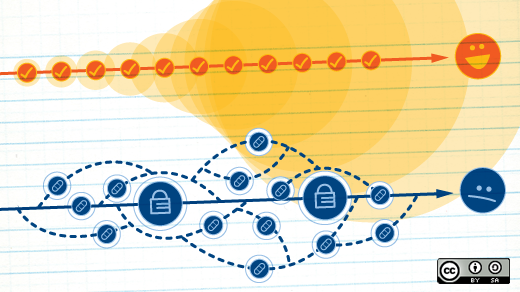mirror of
https://github.com/LCTT/TranslateProject.git
synced 2025-01-19 22:51:41 +08:00
54 lines
5.7 KiB
Markdown
54 lines
5.7 KiB
Markdown
Mastering CI/CD at OpenDev
|
|
======
|
|
|
|

|
|
After launching in 2017, the [OpenDev Conference][1] is now an annual event. At the inaugural event last September, the conference focus was on edge computing. This year's event, taking place May 22-23, will be focused on Continuous Integration/Continuous Deployment (CI/CD) and will be co-located with the OpenStack Summit in Vancouver.
|
|
|
|
|
|
|
|
I was invited to participate in the program committee for OpenDev CI/CD based on my background on the CI/CD system for the OpenStack project and my recent move into the container space. Today I frequently talk about CI/CD pipelines using various open source technologies, including [Jenkins][3] [GitLab][2],[Spinnaker][4] , and [Artifactory][5]
|
|
|
|
This event is exciting for me because we're bringing two open source infrastructure ideas together into one event. First, we'll be discussing CI/CD tooling that can be used by any organization. To this end, in the [keynotes][6] we'll hear practical talks about open source CI/CD tooling, including a talk about Spinnaker from Boris Renski and one from Jim Blair on [Zuul][7]. The keynotes also will include higher-level talks about the preference for open technologies, especially across communities and inside open source projects themselves. From Fatih Degirmenci and Daniel Farrell we'll hear about sharing continuous delivery practices across communities, and Benjamin Mako Hill will join us to talk about why free software needs free tools.
|
|
|
|
Given the relative newness of CI/CD, the rest of the event is a mix of talks, workshops, and collaborative discussions. When selecting from talks and workshops submitted, and coming up with collaborative discussion topics, we wanted to make sure there was a diverse schedule so anyone on the open CI/CD spectrum would find something interesting.
|
|
|
|
The talks will be standard conference style, selected to cover key topics like crafting CI/CD pipelines, improving security when practicing DevOps, and more specific solutions like container-based [Aptomi][8] on Kubernetes and doing CI/CD in ETSI NFV environments. Many of these sessions will serve as an introduction to these topics, ideal for those who are new to the CI/CD space or any of these specific technologies.
|
|
|
|
The hands-on workshops are longer and will have specific outcomes in mind for attendees. These include "[Anomaly Detection in Continuous Integration Jobs][9]," "[How to Install Zuul and Configure Your First Jobs][10]," and "[Spinnaker 101: Releasing Software with Velocity and Confidence][11]." (Note that space is limited in these workshops, so an RSVP system has been set up. You'll find an RSVP button on the session links provided here.)
|
|
|
|
Perhaps what I'm most excited about are the collaborative discussions, and these take up over half of the conference schedule. The topics were chosen by the program committee based on what we've been seeing in our communities. These are "fishbowl"-style sessions, where several people get in a room together to discuss a specific topic around CI/CD.
|
|
|
|
The idea for this style of session was taken from developer summits that the Ubuntu community pioneered and the OpenStack community continued. Topics for these collaborative discussions include separate sessions for CI and CD fundamentals, improvements that can be made to encourage cross-community collaboration, driving CI/CD culture in organizations, and why open source CI/CD tooling is so important. Shared documents are used to take notes during these sessions to make sure that as much knowledge shared during the session is retained as possible. It's also common for action items to come from these discussions, so community members can push forward initiatives related to the topic being covered.
|
|
|
|
The event concludes with a [Joint Conclusion Session][12], which will be summarizing the key points from the collaborative discussions and identifying work areas that attendees wish to work on in future.
|
|
|
|
Registration for this event is included in [OpenStack Summit registration][13], or tickets for this event only can be purchased for $199 onsite at the Vancouver Convention Center. Learn more about tickets and the full agenda on the [OpenDev website][1].
|
|
|
|
I hope you'll join us in Vancouver for an exciting two days of learning, collaborating and making progress together on CI/CD.
|
|
|
|
--------------------------------------------------------------------------------
|
|
|
|
via: https://opensource.com/article/18/5/opendev
|
|
|
|
作者:[Elizabeth K.Joseph][a]
|
|
选题:[lujun9972](https://github.com/lujun9972)
|
|
译者:[译者ID](https://github.com/译者ID)
|
|
校对:[校对者ID](https://github.com/校对者ID)
|
|
|
|
本文由 [LCTT](https://github.com/LCTT/TranslateProject) 原创编译,[Linux中国](https://linux.cn/) 荣誉推出
|
|
|
|
[a]:https://opensource.com/users/pleia2
|
|
[1]:http://2018.opendevconf.com/
|
|
[2]:https://about.gitlab.com/
|
|
[3]:https://jenkins.io/
|
|
[4]:https://www.spinnaker.io/
|
|
[5]:https://jfrog.com/artifactory/
|
|
[6]:http://2018.opendevconf.com/schedule/
|
|
[7]:https://zuul-ci.org/
|
|
[8]:http://aptomi.io/
|
|
[9]:https://www.openstack.org/summit/vancouver-2018/summit-schedule/events/21692/anomaly-detection-in-continuous-integration-jobs
|
|
[10]:https://www.openstack.org/summit/vancouver-2018/summit-schedule/events/21693/how-to-install-zuul-and-configure-your-first-jobs
|
|
[11]:https://www.openstack.org/summit/vancouver-2018/summit-schedule/events/21699/spinnaker-101-releasing-software-with-velocity-and-confidence
|
|
[12]:https://www.openstack.org/summit/vancouver-2018/summit-schedule/events/21831/opendev-cicd-joint-collab-conclusion
|
|
[13]:https://www.eventbrite.com/e/openstack-summit-may-2018-vancouver-tickets-40845826968?aff=VancouverSummit2018
|